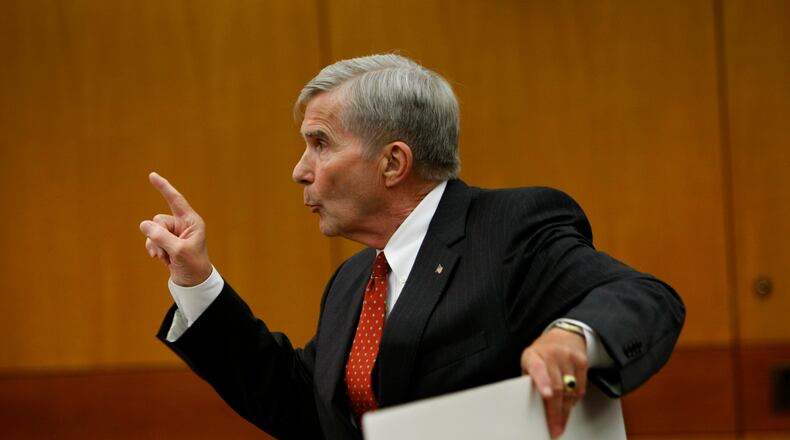On this snowy Tuesday morning, former Georgia Attorney General Michael Bowers met with reporters to give his assessment of H.B. 218 and S.B. 129, the two "religious liberty" bills before the General Assembly.
The Republican, a one-time villain of the gay-rights movement, was hired to do so by Georgia Equality. As expected, Bowers was not kind. Read the entire document below. The concluding paragraph:
"This legislation is not about gay marriage, or contraception, or even so-called "religious freedom." It is more important than all of these, because it ultimately involves the rule of law. Regardless of whether one agrees with a particular policy, or if it offends one's religious sensibilities, the proposed [Religious Freedom Restoration Act] is bad for all Georgians of good faith, or for that matter, of any faith whatsoever. It is not just bad public policy; it is ill-conceived, unnecessary, mean-spirited and deserving of a swift death in the General Assembly."
Click here to download Bowers' analysis, or scroll through it below:
[googleapps domain="docs" dir="file/d/0B_KEK8-LWmzhUjdmMlRHZ0h2TEk/preview" query="" width="640" height="480" /]
The proposal is at the center of one of the fiercest debates this legislative session, with supporters casting it as a new line of defense to protect people of any religion from government intrusion while critics warn it's a discriminatory end-run on the First Amendment that could allow business owners to cite religious beliefs to deny people service.
With leading business leaders largely mum in recent weeks over the bill and Gov. Nathan Deal signaling he's open to signing it, Bowers has become the proposal's most visible critic. In a press conference at his downtown Atlanta law office, he said he hoped to mount a legal challenge against the bill "right out of the box" if it becomes law.
"And I'm going to whip its tail," he said.
He echoed the words of other opponents by saying it would send the message to sought-after millennials that Georgia is "closing its mind and doors to bright young people." The potential aftershocks, he said, include a new loophole for Ku Klux Klan members to skirt the state's anti-mask laws and protections for parents to abuse their children under the guise of religion.
Bowers seems an unlikely champion for the cause. As the state's top lawyer in the 1980s, he helped convince the U.S. Supreme Court to uphold the criminalization of "homosexual sodomy." And in 1992, he cited the state's anti-sodomy law as just cause for rescinding a job offer to a gay attorney named Robin Shahar.
His views have since evolved, he said, though he wasn't exactly keen on self-reflection.
"This isn't about gay marriage. It's not about religious freedom. It's about the rule of law. And I feel really, really strongly about it. And it doesn't take a rocket scientist to tell you it's a disaster," he said, adding: "I'm not sure myself how my views have changed. But I know they have changed. I just know I've changed. And I hope for the better."
Shahar, the aforementioned attorney, said she "wholeheartedly" agrees with Bowers' analysis of the bill. And she said his personal turnabout is a reminder that the battle for civil rights doesn't end with a court ruling.
"The fight ends when people understand that each of us are humans and they look past stereotypes," said Shahar, who is now Atlanta Mayor Kasim Reed's adviser on LGBT issues. "I give Michael Bowers and Georgia Equality so much credit for their courage to stand up and do that."
Bowers, for his part, said there are certainly religious injustices but also ample protections already built into state and federal law. He dismissed the argument that Georgia lawmakers are simply seeking to codify federal religious freedom protections signed into law by President Bill Clinton.
"That doesn't make a hoot of difference. The federal law is no paragon of virtue itself."
He was asked if there's anything the bill's sponsors can write into the legislation to address his concerns. Bowers, without missing a beat, offered his answer.
"No. Nothing. Maybe the Plan of Salvation."
About the Author
The Latest
Featured




